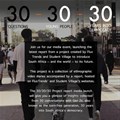On the verge of the 2024 election, Flux Trends and Student Village released its 30/30/30 Project Report, which interviewed 30 young South Africans under 30, thirty years into our new democracy.

Source: © Flux Trends
Flux Trends Gen Z young is dissatisfied ver how much progress has been made in these 30 years in SA
This project provides a glimpse into how our young South Africans feel about themselves, their prospects and the future of our country.
The prevailing narrative among these young respondents is one of dissatisfaction over how much progress has been made in these 30 years, especially for South Africans living below the breadline.
The research is divided into three sections:
- Personal: Regarding their personal lives with a focus on mental health.
- Professional: Regarding their academic qualifications, employment and the future of work.
- Public: Regarding their level of civic engagement and what causes are important to them.
Key report findings
- Overall the mental health of the interviewees is positive, bolstered by close bonds with families, an openness to therapy, and a propensity for meeting friends in real life rather than online.
- There is evidence of mental duress detected through admissions to thoughts and attempts at suicide and taking antidepressants. In our sample, those with absent fathers were particularly prone to suicide and antidepressants.
- Ancestral beliefs practised alongside traditional Christianity.
- A strong female presence was detected, in terms of who they were raised by and who their role models are.
- Interviewees are part of large families with many generations living in one household, pointing to the notion of a collectivist society - one that embraces the elderly, unemployed adult dependents and differently-abled. This is in contrast to the more individualistic mindset of the West.
- Most interviewees save money regularly for more short-term expenses, such as groceries and devices, not for purchasing homes or retirement. This is despite many indicating a desire to retire early.
- Delaying adulthood is a worldwide trend for this generation - this was the case in our sample. Many still live at home with their parents, are unmarried and do not own cars or property.
- Their social media behaviour highlighted the presence of different identities in different contexts. Facebook, for example, was where they stay in touch with older relatives and thus are on their best behaviour. Twitter, on the other hand, was known to be a place to rant and be provocative.
- This fracturing of identity carries over to the workplace, where young people do not want to reveal too much to their colleagues and employers. Their work personas are strictly professional and 9-5.
- Many have side hustles that appear to be what they are passionate about and plan to make their full-time occupation.
- Increasingly young people are moving from job to job. South African youth, while less inclined to job-hop, are also part of this shift away from remaining in one job for extended periods.
- Most of the unemployed interviewees are highly educated, highlighting a disconnect between education and the skills required by industry. In many instances, the interviewees were aspiring to jobs highly divergent from what they are currently or have studied.
- Their outlook on their futures is positive, albeit slightly naive. They show little concern over the threat of AI redundancy and climate change. They also believe that they have agency over how their future unfolds.
- Parents or partners support some financially, while others participate in ‘black tax ’, which they see as a form of gratitude instead of a burden to their caregivers.
- This generation is known to have a high social justice barometer and South African youth are no exception. However, Gen Zs moral compass is tempered by pragmatism, evidenced by many admitting that securing a job takes priority over exercising their values. This is expected in an environment of rampant youth unemployment.
- A large majority of our sample are registered to vote, and a smaller, yet significant, minority are unsure of who to vote for.
- They do believe in the importance of democracy but are doubtful of its efficacy in these 30 years. Some indicate that they have been sold a vision of the future that is turning out to be a false promise. However, they want to believe in a better South Africa. It was heartening to find that those who indicated an openness to emigrating want to return to SA.
- About half of this sample have experienced racism yet the same proportion also believe that racism belongs to older generations.
It is essential to be mindful that, while these findings shed light on youth from a South African perspective and important commonalities were found, this is not a homogeneous group.
Some are motivated by a need to survive in the face of financial challenges. Others (albeit a smaller cohort) operate from the standpoint of financial security by having access to generational wealth.
Both cohorts are vital to the fabric of our society.
The trends and insights detailed in this report should guide employers and policymakers in understanding young South Africans so that they can play their part in ensuring a future where all our youth thrive and are part of building a better South Africa.



















































